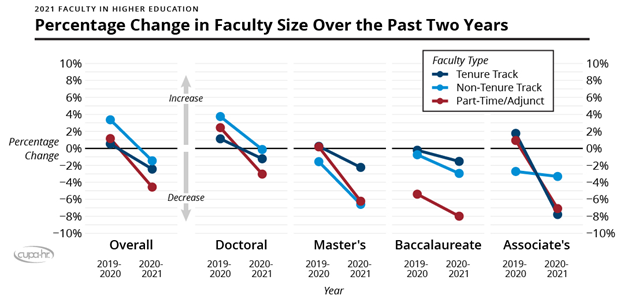PRESS RELEASE
FOR IMMEDIATE RELEASE
March 30, 2021
New Report Highlights Changes to Faculty Workforce in the Wake of the Pandemic
The severe budget cuts in the wake of the COVID-19 pandemic forced many institutions to freeze hiring, cut positions and, in some cases, decrease salaries. The 2021 CUPA-HR Faculty in Higher Education Report released today highlights the overall changes to faculty size and salaries over the past year.
In the academic year prior to the pandemic (2019-20), there was an overall increase in all types of faculty — tenure-track, non-tenure-track and adjunct — with non-tenure-track faculty increasing the most (3.36 percent). This changed drastically in the 2020-21 academic year, when all faculty types experienced overall job losses.

Adjunct faculty experienced the greatest decrease, with a nearly 5 percent reduction in workforce. Master’s, baccalaureate and associate’s institutions reduced their adjunct workforce by more than 6 percent. Tenure-track faculty experienced the greatest percentage decrease at associate’s institutions (-7.80 percent).
The greatest percentage of job losses among full-time faculty were in the disciplines of Leisure and Recreational Activities and Library Science, each with more than a 13 percent decrease in the number of full-time faculty. In terms of sheer number of positions, the disciplines of Business, Management, and Marketing and Biological and Biomedical Sciences lost the greatest number of faculty over the past academic year — one-third to nearly one-half of institutions with faculty in these disciplines reported cuts in these faculty.
Other key findings include:
- The overall median salary increase for full-time faculty from 2019-20 to 2020-21 was 0.69 percent, the lowest increase since 2010.
- The proportions of women and racial/ethnic minorities within tenure-track faculty are not much different from last year, indicating that faculty cuts made during the past year did not disproportionately impact the representation of women and minorities in tenure-track faculty overall.
- Women and minorities are less represented in associate and full professor ranks among tenure-track faculty, a trend that has persisted for many years.
- Adjunct faculty earn the most pay per credit hour at doctoral institutions ($1,288) and the least at associate’s institutions ($917). This difference may be due to the fact that at most doctoral institutions, the department hiring the adjunct sets their pay, whereas a single entity typically sets the pay for all adjuncts at most associate’s institutions.
A total of 263,721 full-time faculty positions were reported for this year’s survey. In total, 793 institutions provided incumbent-level data for full-time faculty, and 362 of those institutions provided aggregate data for adjunct faculty. To learn more about the Faculty in Higher Education Survey, read the overview. Salaries, demographic comparisons and detailed trend information are available in the full report.
About CUPA-HR
CUPA-HR is the recognized authority on compensation surveys for higher education, with its salary surveys designed by higher ed HR professionals for higher ed HR professionals and other campus leaders. This marks the 40th year of data collection for CUPA-HR’s Faculty in Higher Education Survey, the only faculty survey that provides data for the current academic year, maintains institution anonymity, collects data by rank and specific discipline, and collects comprehensive demographic data. Learn more about CUPA-HR research.
CUPA-HR is higher ed HR. We serve higher education by providing the knowledge, resources, advocacy and connections to achieve organizational and workforce excellence. Headquartered in Knoxville, Tennessee, and serving over 33,000 HR professionals and other campus leaders at nearly 2,000 member institutions and organizations around the country and abroad, the association offers learning and professional development programs, higher education salary and benefits data, extensive online resources and just-in-time regulatory and legislative information.
Contact Information
Erin Rosolina
Marketing Manager – Communications and Marketing
[email protected]


